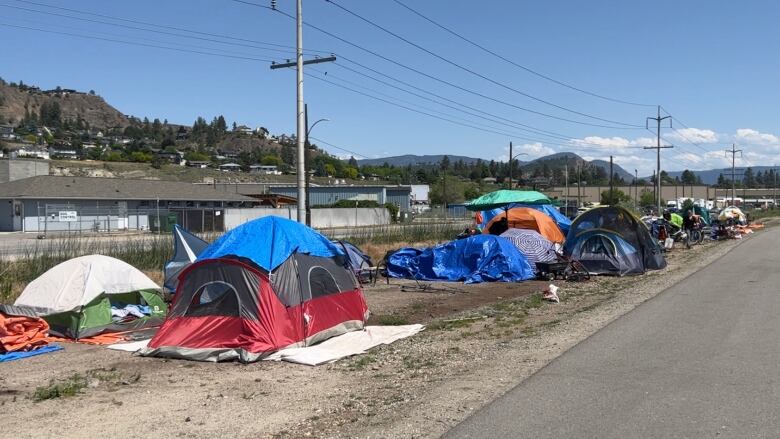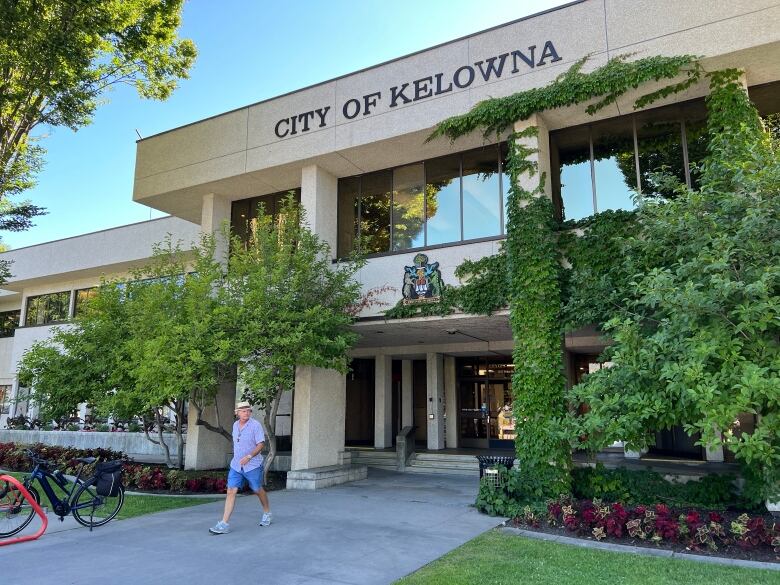City terminates relationship with Kelowna non-profit for failing to end homelessness
City of Kelowna will take up all duties performed by Journey Home Society starting in 2024

An initiative aimed at eradicating homelessness in Kelowna, B.C., has lost the city's support as the situation has grown worse in recent years.
On Tuesday, Kelowna announced it would end its relationship with the Central Okanagan Journey Home Society, a non-profit organization responsible for implementing the city's five-year strategy to house or shelter over 2,100 people living on the streets by the end of 2025.
The city's decision followed a performance review conducted earlier this year. City council hasn't disclosed the review's findings ora timeline for the disclosure.
Established in February 2019, the Journey Home Society says it received $150,000 for 2019 and $250,000 annually from 2020 to 2023 including federal funding from the City of Kelowna to house people experiencing homelessness.
Agency co-ordinating housing resources
The non-profit positions itself as an agency co-ordinating resources from B.C. Housing, non-profits specializing in homelessness and addictions services, and different levels of government. It had set ambitious targets to achieve what it called "functional zero" homelessness, which it said meant people wouldn't be chronically unhoused or unsheltered.
The Journey Home Society's predecessor,Journey Home Task Force, which was made upof community leaders and City of Kelowna officials, estimated in 2018 that it would house or shelter an increasing number of people each year: from 165 in 2019 to 722 in 2023.
The agreement with the city would have expired on Dec. 31, 2023. Instead, the city said, Journey Home's responsibilities co-ordinating resources for building supportive housing and shelters would be incrementally transitioned to a team led by the City of Kelowna. The team will officially take over all the responsibilities on Jan. 1, 2024.

Over the past five years, the organization has facilitated B.C. Housing's construction of more than 300 supportive housing units with mental health and addiction treatment programs provided by non-profits, according to the city.
Failure to attain functional zero homelessness
However, the city says it has not been able to achieve its ultimate goal of achieving functional zero homelessness in the City of Kelowna, whose population grew a staggering 13.5 per cent from 2016 to 2021.
In an interview with local media outlet Castanet last month, Kelowna Mayor Tom Dyas said about 130 individuals were still camping along the Okanagan Rail Trail at the north end of Kelowna, and about 100 individuals were left unhoused in other parts of the city.

In a statement Tuesday announcing the decision, Dyas said the city decided to take a "renewed approach" to addressing homelessness that had been complicated by the COVID-19 pandemic and the drug overdose crisis.
Dyas says the city will announce details of itsnew approach this fall.
"[Kelowna] council's priorities are crime and safety and also communication and transparency, so we're going to work upon those priorities and make certain that we're listening to the community," he told host Chris Walker Friday on CBC's Daybreak South.
According to a report by B.C. Housing in 2021, there were 297 people experiencing homelessness in Kelowna on a single night, higher than in neighbouring Interior communities like Vernon (224), Kamloops (206), and Penticton (114).
Journey Home is a success: task force chair
Kyleen Myrah, a business professor at the Okanagan College in Kelowna and co-chair of the Journey Home Task Force, acknowledged what she described as Dyas's and his council's intention to "put their new stamps" on public policies, but said she was proud of Journey Home Society's achievements housing people despite the challenges.
"We went through a pandemic. We've got rising costs and inflation and more unaffordability you have to deal with a situation in a context that is continually changing.
"Is that a failure? No. It's just that the situation has changed, and it may require some different solutions moving forward," she said on Daybreak South.
Martin Bell, a Kelowna engineering consultant who also co-chaired the Journey Home Task Force, said he is willing to participate in similar projects in the future,
"I would do it again it's really important for the community," he told CBC'sDaybreak South.
"It was not an easy process. It was a life-changing process too. It was something that very deeply impacted me, and I still can feel it to this day."
With files from Chris Walker and Daybreak South












_(720p).jpg)


 OFFICIAL HD MUSIC VIDEO.jpg)
.jpg)



























































































